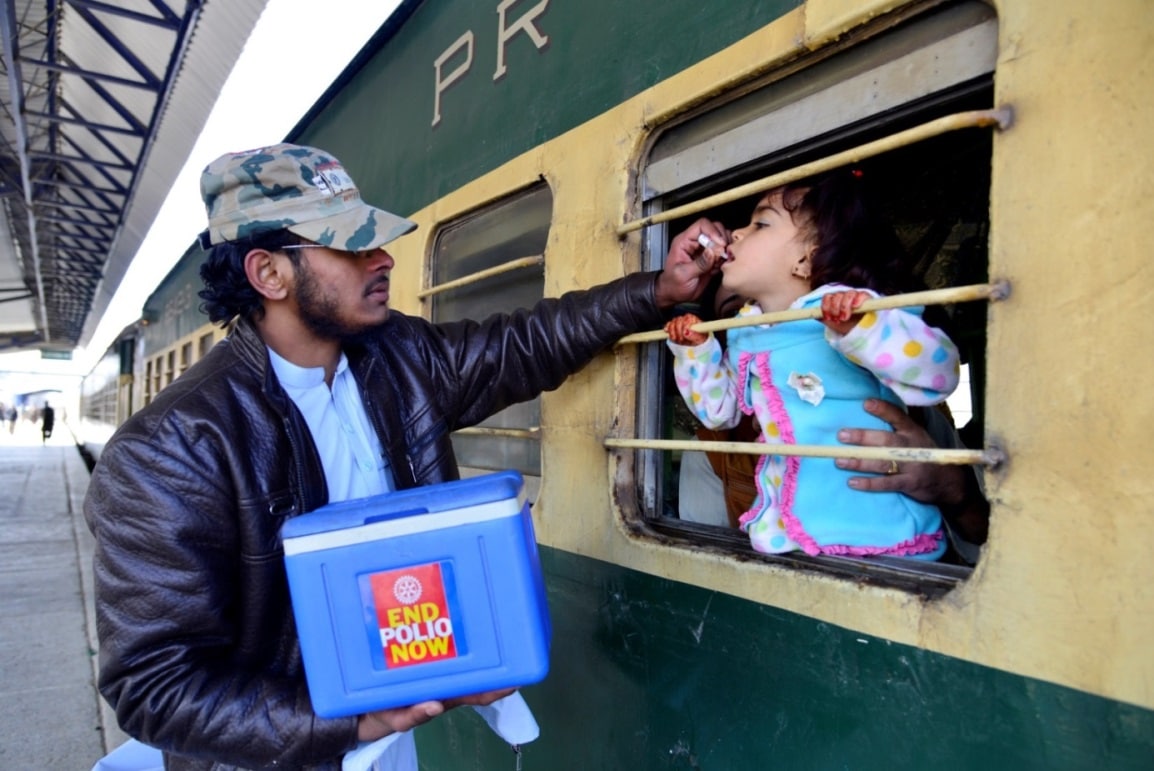Investing in a polio-free future today: Launch of the new GPEI Investment Case
Photo: Waseem Niaz/UNICEF
The last mile of worldwide polio eradication proves to be the hardest: With support from the German government, the Global Polio Eradication Initiative (GPEI) calls for renewed commitments to achieve a polio-free world by 2026.
On April 26, 2022, the Global Polio Eradication Initiative (GPEI) launched its new investment case which calls for urgent additional funding of US$ 4.8 billion to eradicate all forms of polio globally by 2026. The goals of this financing include vaccinating 370 million children every year for the next five years and continuing global surveillance activities for polio and other diseases in 50 countries.
The world is currently witnessing historic lows of wild polio cases in the two remaining endemic countries Afghanistan and Pakistan. But reaching the last mile proves to be the hardest part of polio eradication yet – not least due to setbacks like the recent detection of the first wild polio virus in Malawi in 30 years and increased circulation of vaccine-derived polio viruses, which can emerge in under-immunized communities, particularly in Africa. Moreover, the GPEI is working in the world’s most challenging areas in terms of geography, conflict, poverty, weak health infrastructure, and communities left behind. To finally eradicate polio, renewed commitment from governments and partners is required.
Germany will continue to champion polio eradication
The Government of Germany has been a committed partner to the GPEI for more than 30 years as the third-largest donor to the global polio eradication efforts.
“Germany is committed to finishing the job. That is why we support this investment case to collect the 4.8 billion US dollars outlined”, said Parliamentary State Secretary Niels Annen at the launch of the GPEI investment case. He further announced that the Government of Germany will co-host the GPEI pledging moment during the 2022 World Health Summit in October. “During its Presidency of the G7 this year, Germany will continue to advocate among global leaders for a joint approach towards the most pressing issues in global health, including polio eradication”, Mr. Annen said during his speech.
Achievements of three decades of global efforts
Thanks to efforts by national governments, health workers, international partners and donors, the number of polio cases around the world has been reduced by 99% in the last over 30 years and some 20 million people have been protected from being paralyzed. The number of endemic countries decreased from 125 in year 1988 to two today and only one of five WHO regions is yet to be declared as wild polio free. This brings the world close to achieving a historical milestone – the eradication of the second infectious human disease after smallpox.
In addition, the polio infrastructure in partner countries had and will continue to contribute to the broader health systems beyond polio eradication. Most of the polio staff, for example, also helped delivering other critical health services and products to remote communities as well as supported broader immunization efforts to reach children with additional lifesaving vaccines. Furthermore, the polio workforce was engaged in the successful response to the Ebola outbreak in Nigeria in 2014 and is currently supporting the COVID-19 response since the beginning of the pandemic.
Photo: Serge Wingi/UNICEF
What it takes to get the job done
Agility and flexibility are crucial to ensure GPEI’s ability to respond to persistent and newly emerging challenges of polio eradication. Against this background, the GPEI has adopted a new strategy (2022-2026) which aims at eradicating all forms of polio by adapting ways of working and introducing innovations. It puts integration with essential immunization services and other health services at its centre in order reach zero-dose children, who have never been vaccinated, and underserved communities. Further transformative elements of the new strategy are accountability and political will from all stakeholders as well as community engagement.
In the upcoming five years, the GPEI aims at maintaining commitment to polio eradication at all levels – global, regional, and national. By placing communities at the centre, their confidence and trust in immunization and thereby their support of polio campaigns should be increased. Besides understanding community barriers to immunization, this also implies addressing the needs of communities beyond polio through integrated campaigns. Furthermore, the GPEI wants to strengthen its gender-responsiveness through a systematic approach to gender mainstreaming as this key to the success of polio eradication. Concretely, the GPEI plans to address gender-related barriers to vaccination inequities and to increase women’s meaningful participation at all levels.
Choosing a polio-free world for our future generations
But to fully implement the new strategy, which hopefully leads us to a polio-free world, investments need to be made now. The estimated investment of US$ 4.8 billion may cumulatively save a US$ 33.1 billion by 2100 through reduced costs of surveillance and vaccination. If the world misses this window of opportunity, however, we will have to continuously control polio at low levels like other vaccine-preventable diseases. In this scenario, the spending for controlling the virus would exceed the estimated eradication costs of the GPEI Investment Case by 2032.
Eradicating polio is about more than “just” tackling one disease. Resources and capacities will become available to address other pressing issues in global health, particularly crucial core functions of health care systems which were strengthened through the polio infrastructure around the world. Through this coming five-year investment, the GPEI wants to leave a legacy of healthier children and a healthier future. This is only possible if the choice is made now by partners, governments, donors, civil society, foundations, and corporations. Together, we can eradicate polio once and for all.
Lan Huong Le, April 2022

